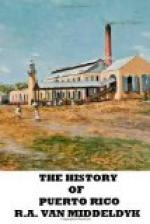Abbad makes some suggestions for increasing the population. He proposes the distribution of the unoccupied lands among the “agregados” or idle “hangers-on” of each family; among the convicts who have served out their time and can not or will not return to the Peninsula; among the freed slaves, who have purchased their own freedom or have been manumitted by their masters; and, finally, among the great number of individuals who, having deserted from ships or being left behind, wandered about from place to place or became contrabandists, pirates, or thieves.
“Their numbers are so small and the soil so fruitful they generally have an abundance of bananas, maize, beans, and other food. Fish is abundant, and few are without a cow or two. The only furniture they have and need is a hammock and a cooking-pot. Plates, spoons, jugs, and basins they make of the bark of the ‘totumo,’ a tree which is found in every forest. A saber or a ‘machete,’ as they call it, is the only agricultural implement they use. The construction of their houses does not occupy them more than a day or two.”
The good friar goes on to tell us that, through indolence, they have not even learned from the Indians how to protect their plantations from the fierce heat of the sun and avoid consequent failure of crops in time of drought, by making the plantations in clearings in the forest, so that the surrounding walls of verdure may give moisture and shade to the plants. “Nor have they learned to build their bohios (huts) to windward of swamps or clearings to avoid the fever-laden emanations.”
* * * * *
The stirring events in Europe that marked the end of the eighteenth and the beginning of the nineteenth centuries did not find these conditions much changed, though some advance had been made and was being made in spite of the prohibitive measures of the Government, which were well calculated to check all advance. To prevent the spread of the ideas that had given birth to the French Revolution, absolute powers were granted to the captains-general, odious restrictions were placed upon all communication with the interior, sacrifices in men and money were demanded on the plea of patriotism, and a policy of suspicion and distrust adopted toward the colonies which in the end fomented the very political aspirations it was intended to suppress.
From the outbreak of the French Revolution, Spain was entangled in a maze of political difficulties. The natural sympathy of Charles IV for the unfortunate King of France well-nigh provoked hostilities between the two nations from the very beginning. The king gave public expression to his opinion that to make war on France was as legitimate as to make war on pirates and bandits; and the Directory, though it took little notice at the time, remembered it when Godoy, the favorite, in his endeavors to save the lives of Louis XVI and his family entered into correspondence with the French emigres. Then war was declared.




